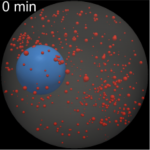
The position of the nucleus in a cell can instruct morphogenesis, conveying spatial and temporal information. In addition, abnormal nuclear positioning can lead to disease. Nucleus centering in mouse oocytes results from a gradient of actin-positive vesicle activity and is essential for developmental success. Here, we analyze 3D model simulations to demonstrate how a gradient in the persistence of actin-positive vesicles can center objects of different sizes. We test model predictions by tracking the transport of exogenous passive tracers. The gradient of activity induces a centering force, akin to an effective pressure gradient, leading to the centering of oil droplets with velocities comparable to nuclear ones. Simulations and experimental measurements show that passive particles subjected to the gradient exhibit biased diffusion toward the center. Strikingly, we observe that the centering mechanism is maintained in meiosis I despite chromosome movement in the opposite direction; thus, it can counteract a process that specifically off-centers the spindle. In conclusion, our findings reconcile how common molecular players can participate in the two opposing functions of chromosome centering versus off-centering.

References:
Active diffusion in oocytes nonspecifically centers large objects during prophase I and meiosis I.
Colin A, Letort G, Ratzin N Almonacid M Ahmed W Betz T, Terret ME, Gov N, Voituriez R, Gueroui Z, Verlhac HM.
Journal of Cell Biology, 2020
DOI: 10.1083/jcb.201908195
